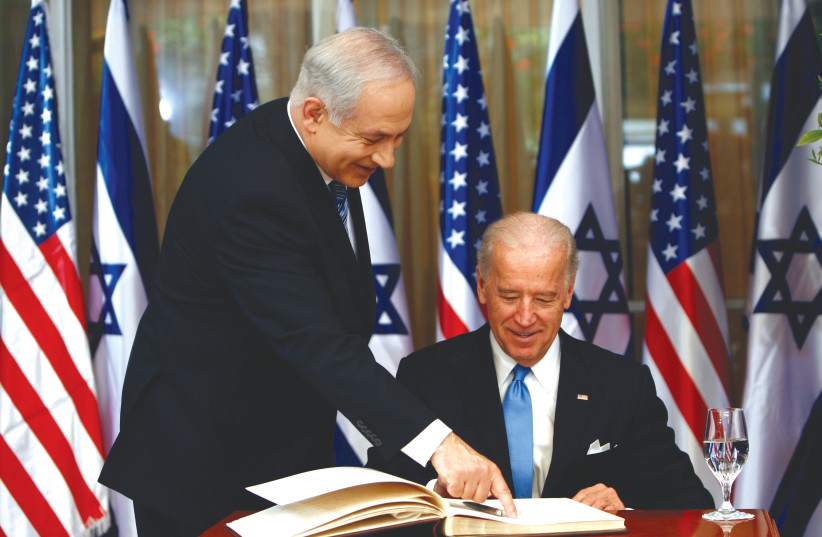US President Joe Biden’s emphatically negative comments about Prime Minister Benjamin Netanyahu and the ruling coalition’s judicial overhaul hit Israel like a ton of bricks.
There is no way to quickly clean up the negative impact in the public relations and diplomatic sphere.
But the bigger question everyone is asking is whether the deep values chasm (values because it is about democratic identity and not “just” policy on Iran or the Palestinians) developing between Biden and Netanyahu will, or already has, spilled over into the security sphere.
The last time Netanyahu got along very poorly with a US president, Barack Obama, the sides were careful to make sure that the billions in defense aid and crucial intelligence sharing that the US provides Israel continued unabated.
But after Biden’s broadside against Netanyahu, which itself came after weeks of escalating rhetoric from US officials about concerns with the judicial overhaul and with provocative statements from Israeli ministers against the Palestinians, no one is sure whether new boundaries may be crossed.

And to put it bluntly, as powerful as Israel is currently, it cannot continue to fund the IDF as it currently exists, especially the full force of iron dome batteries, without the billions in US defense aid.
Without US intelligence help, diplomatic backing and continued commitment to sell Jerusalem the most advanced weapons, Israel and the IDF could also become endangered on many other security fronts.
In just one example, Israel's ability to deter Iran with the threat of a preemptive strike is partially dependent on how fast the US sends its KC-46 aircraft which would enable Israeli attack aircraft to refuel in order to fly far enough to attack Tehran.
Austin addressed judicial reform during his visit
The issue came into stark contrast on March 9: https://www.jpost.com/breaking-news/article-733794 addressed both US security cooperation and the Israeli government’s judicial overhaul policy at a press conference with Defense Minister Yoav Gallant at Israel Aerospace Industries (IAI) in Lod.
In fact, the massive countrywide protests against the judicial overhaul were what forced the press conference to be relocated from the Defense Ministry in Tel Aviv to IAI’s offices.
Although Austin took the trouble to mention the US’s “ironclad commitment” to Israel’s security several times, he was also likely the first US secretary of defense to express public concern about internal Israeli judicial branch politics.
It is one thing for a US diplomat to talk about internal Israeli policies, but for a defense secretary to do so is unheard of.
The Jerusalem Post learned at the time that Austin’s choice to weigh in on the judicial overhaul issue was probably limited to being seen within the context of general comments he made about human rights in Egypt and other countries. But there were concerns that it also could be seen within the context of a letter by US House Appropriations Committee ranking Democrat Rosa DeLauro, asking the US government to “use all diplomatic tools available” to halt the judicial overhaul.
Austin also expressed his concern about Israel’s commitment to an independent judiciary after Biden, US Secretary of State Antony Blinken and US Ambassador to Israel Thomas Nides had already made stark warnings to Israel about the judicial overhaul.
Former senior IDF Intelligence Col. (res.) Eldad Shavit has written in multiple INSS posts that Israel must view US statements on the judicial overhaul issue, taking into account that if the US assessed “that the shared values have been damaged.”
This could “have a direct effect on the relations between the two countries – particularly in this sensitive period, when the security challenges, especially on the part of Iran… require a tightening of coordination between the two countries,” he wrote
Austin had said: “I wanted to be here to make something very clear: America’s commitment to Israel’s security is ironclad, and it’s going to stay that way. As President [Joe] Biden said in his visit to Israel last year, ‘The connection between the Israeli people and the American people is bone deep.’ Israel is a major strategic partner for the US.”
But then he continued, “and our bond is rooted in far more than just shared interests. It’s rooted in the shared values of democracy and freedom and the rule of law. And those values remain essential.”
Austin again referred to Biden’s messaging when he said the democracies of Israel and the US “are both built on strong institutions, on checks and balances, and on an independent judiciary.”
There is no answer yet to this question of whether the US has shifted away some of its support from Israel in the defense realm.
But the Post understands that senior IDF officials and senior CENTCOM officials have had regular and deep contacts ongoing throughout this week about joint cooperation.
In fact, Pentagon spokesperson Phillip Ventura, Lt. Col., USAF said that "in the Department of Defense, we want to focus on our military-to-military relationship and how to best protect and defend the territory of Israel, and the people of Israel, the United States, and the Middle East."
"This is why we are urging Israeli leaders to find a compromise as soon as possible. US support for Israel’s security and democracy remains ironclad and our security ties have not missed a beat," he added.
In other words, so far, there have been no concrete indications of the security realm being negatively impacted by the political realm, but Israeli security officials are tense about the future.
The firing of Gallant with whom Austin just invested time and energy during a visit to Israel which likely will not happen again for a year or more did not help.
As Biden said, all of what is happening now may be his administration’s game of “wait and see” – meaning if no compromise is reached and Biden does not like the new shape of Israeli democracy in the coming months, the hammer could drop, even impacting Israeli-US defense cooperation.
